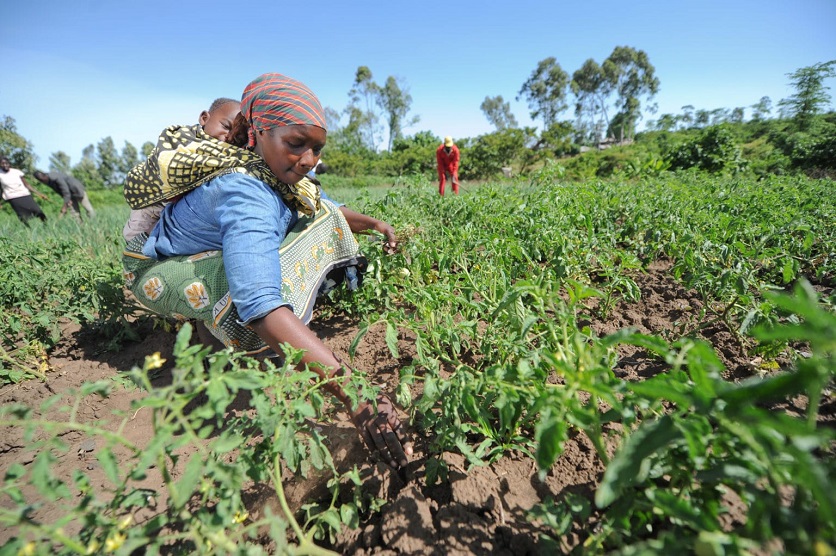
By Kwame Acheampong
Ghana, like many developing countries in the tropical zone of West Africa, is already experiencing climate change impacts that include unpredictable rainfall patterns, rising temperatures, and the greater frequency of extreme weather events including floods. Climate change also affects agricultural production in Ghana, especially in northern Ghana.
According to UNEP, Climate change is expected to: render rainfall patterns increasingly unpredictable and erratic; increase mean temperature by 1.5 – 5.2°C by 2090; and increase sea level by 34.5cm by 2090. This is likely to have serious implications for the agricultural sector, which contributes 54% of Ghana’s GDP.
Agriculture also accounts for more than half of Ghana’s labor force, which has itself been severely affected by changing climate. Crop production has proven to be one of the most climate-sensitive sectors of the country as a whole.
It is estimated that Ghana has experienced a 1.0°C raise in temperature over the last 60 years. This has significantly weakened crop production in northern Ghana, an area that is historically marginalized and characterized by high poverty and malnutrition. Due to their over-dependence on rainfall, farmers in northern Ghana are challenged by changing and increasingly unpredictable rainy seasons.
Ghana, like most sub-Saharan African countries, is predominantly agrarian, with crop production being the main driver of the agriculture sector. More than 80% of growers are smallholder farmers, and their practices are characterized by low labor input and low technology use, high rain-dependence and a low adoption of irrigation.
Less than 2% of arable lands in Ghana is under any form of irrigation. Thus, the over-dependence on quantity and pattern of rainfall for crop production in Ghana exposes the economy and livelihood of citizens to fluctuation in production.
This has been exacerbated by growing unpredictability of weather caused by climate change. For example, the drought of 1983 cut cereal production by some 15% leading to widespread poverty, hunger and deaths.
A World Bank report just last year revealed that temperatures in Ghana have risen by almost 1°C since the 1960s, with Ghana projected to increase mean temperatures by 1.0°C to 3.0°C, by 2050 and upwards of 2.3°C to 5.3°C by the year 2100. The alarming data also showed that climate change is expected to raise the risk and intensity of water scarcity and drought across Ghana.
Water, agriculture, forestry, and human health are the main sectors affected across the country. Ghana’s rainfall itself is highly inconsistent and should remain variable over the next 75 to 80 years with heavy rainfall events looking to increase over time.
In recent years, effects of climate change on food production has been especially felt in the dry Guinea Savannah spanning the five northern regions of Ghana, which has only 1 rainy season compared to the 2 rainy seasons of southern Ghana.
Farmers in the north continuously adapt their practices with the pursuit of weather and climate information for informed decision-making.
However, the widespread changes in weather patterns, has not only reduced agricultural productivity, but also caused flood events – recent one in August 2021 that destroyed about 6,880 acres of farmland in the Upper West Region, affecting a total of 6,623 farmers – that have significantly impacted livelihoods of inhabitants.
A lot needs to be done to address the impact on climate change on crop production in these regions. The government, in an attempt to reduce famers’ over-reliance on rainfall, has initiated the construction of the 1 billion USD Pwalugu Multi-Purpose dam for the irrigation of 25,000 hectares of hectares of agricultural lands, as well as the rehabilitating existing irrigation facilities with the capacity to irrigate 7,817 hectares of farmlands.
The government also began their “One Village, One Dam” policy in 2017, where every village in northern Ghana is to be provided with an earth dam to facilitate year-round crop production.
Though helpful, these initiatives will only barely move the needle, and thus more integrative approaches should be adopted to markedly slow down the impact of climate change and improve agricultural output in northern Ghana.
Significantly, the interplay between crop production and climate change is bi-directional: sustainable crop production can contribute to mitigating climate change by sequestering carbon, reducing the use of inorganic fertilizers and hence climate-warming nitrous oxide emissions, reducing flooding-related methane emissions.
New innovations and technologies will have to be introduced so that Ghanaian farmers can have more effective crop management systems, which will increase food production, lower overall costs, while slowing down climate change by reducing greenhouse emissions and sequestering more carbon.
Very critical to this is the introduction of climate smart agriculture (CSA) interventions which the FAO defines as farming techniques that transform agri-food systems towards green and climate resilient practices, and include on-farm actions such as: planting varieties that are high-yielding and tolerant to biotic and abiotic cues; using innovative Ag technologies that improve crop growth and physiology; encouraging farming practice such as– intercropping, crop rotation, mixed cropping, increased use of organic fertilizers and manures, effective irrigation.
At the national level, two significant programs have been formulated with the long-term goal of reducing greenhouse gas emissions.
First, the Green Ghana Project, launched in June 2021 to restore Ghana’s depleted forest cover through tree planting, has resulted in the planting of some 25 million trees across the country.
Secondly, under Ghana’s Integrated Power Sector Master Plan 2019, the government is committed to scaling up the penetration of renewable energy by 10% by 2030; thus, gradually moving away from fossil-based energy production.
These policies would ultimately reduce greenhouse emissions, slow down the devastating effect of climate change, and improve agriculture output and food security.
Kwame Acheampong, PhD was born in Ghana and is Director of R&D and Field Operations at Opti-Harvest











